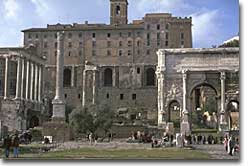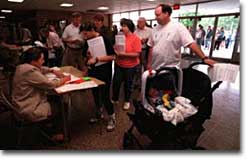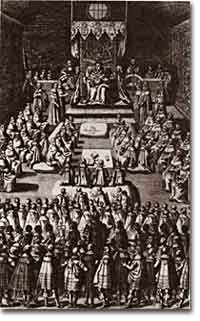1c. What Is a Democracy?

The ancient Romans had a working democracy for the early part of their history. The Forum in Rome is where political meetings and votes were held. The Forum can still be seen today, but most of its buildings are in ruins.
Nowhere is the word "democracy" mentioned in the Declaration of Independence or the U.S. Constitution. How could that be? Our government is a democracy!
Well, for one, as we'll discuss later, the Founders actually feared democratic rule. James Madison expressed this attitude in Federalist #10: "...instability, injustice, and confusion ...have in truth been the mortal disease under which popular governments everywhere perished..." In the late 18th-century, rule by the people was thought to lead to disorder and disruption. Yet a democratically-based government was seen as superior to the monarchies of Europe.
Democracies did not originate with the founding of the United States. The term "democracy" comes from two Greek words: "demos" (the people) and ""kratia" (power or authority). So of course democracy is a form of government that gives power to the people. But how, when, and to which people? The answer to those questions changes through history.

In present-day New England, many small towns hold town meetings in which issues important to the citizens are decided by vote. These meetings are one of the few instances of direct democracy that still operate today. These New Englanders check in at a town meeting.
Democracies are based on "rule of law." The ancient Greeks (particularly Aristotle) valued natural law, the notion that human societies should be governed by ethical principles found in nature. The Greeks are famous for practicing direct democracy, a system in which citizens meet to discuss all policy, and then make decisions by majority rule. However, only free males were considered to be citizens. So their democracy was certainly limited. Today direct democracy is practiced in New England town meetings, where all citizens of voting age meet to decide important political decisions.
But how could direct democracy work in a large, diverse population spread over a geographical distance? Generally, the answer has been that it can't. In its place, the American Founders put "indirect" or "representative" democracy. In this system, representatives are chosen by the people to make decisions for them. The representative body, then, becomes a manageable size for doing the business of government. The Founders preferred the term "republic" to "democracy" because it described a system they generally preferred: the interests of the peopled were represented by more knowledgeable or wealthier citizens who were responsible to those that elected them. Today we tend to use the terms "republic" and "democracy" interchangeably. A widespread criticism of representative democracy is that the representatives become the "elites" that seldom consult ordinary citizens, so even though they are elected, a truly representative government doesn't really exist.

Britain has had a representative democracy since the seventeenth century. Members of the British Parliament are elected from across Britain and represent the interests of their constituents to the government.
Another modern version of democracy is called "democratic centralism," a term made famous by Vladimir Ulyinov Lenin. As the leader of the Russian Revolution in 1917, he established a communist government that allowed no private property to exist. All members of society were theoretically equal. However, Lenin considered a small "vanguard of the revolution" necessary to guide the people and establish order. So a small group of leaders make decisions in the name of the people, based on their perceptions of what the people want and need.
Democracies have come in many shapes and sizes as reflected by the different answers to questions of how, when, and to which people power is given. And although it is not mentioned in the Declaration of Independence nor the Constitution, democracy clearly links to "rule of law" to form a basic principle that profoundly shapes American government.







